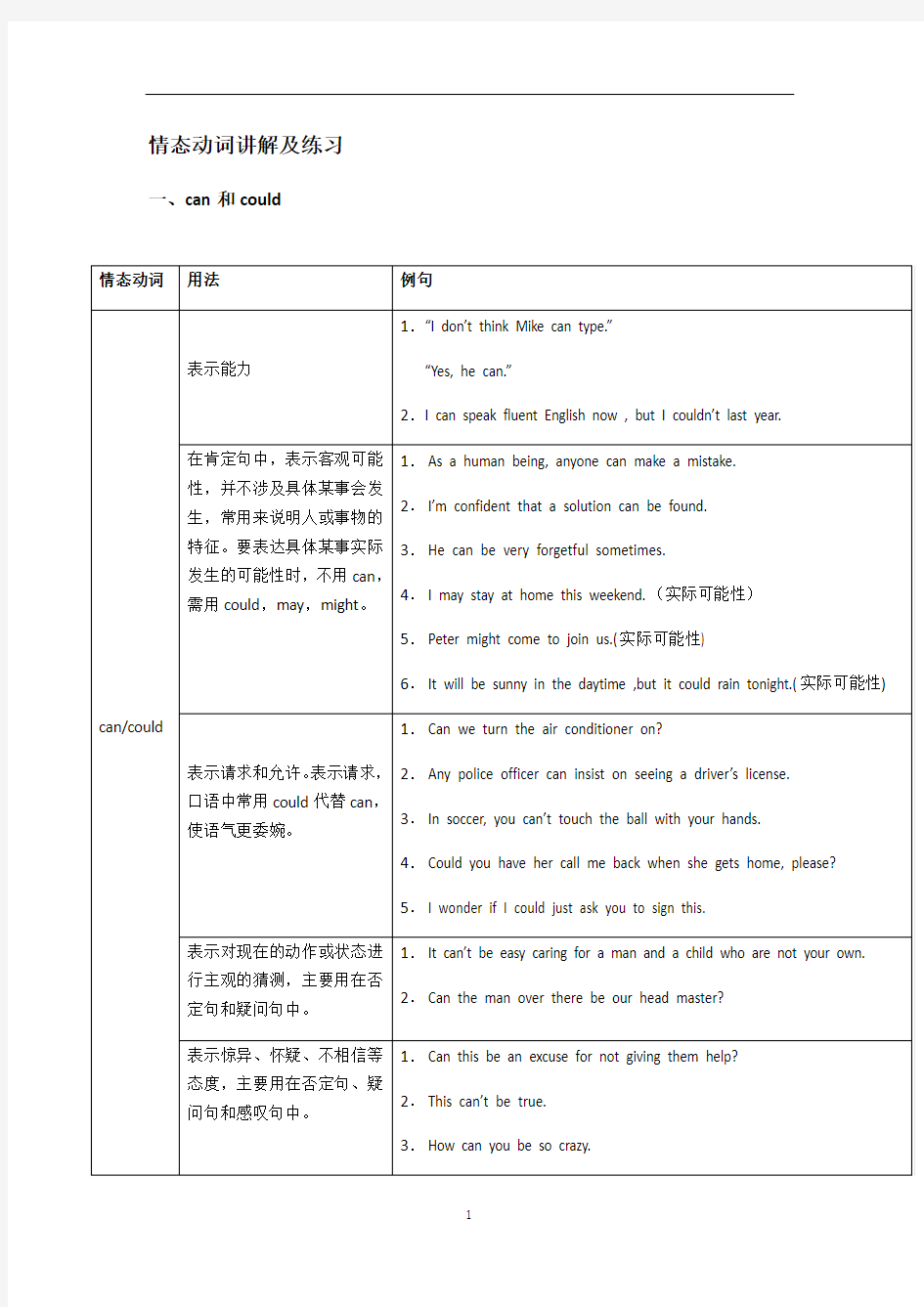高中英语 情态动词讲解及练习(有答案)

- 1、下载文档前请自行甄别文档内容的完整性,平台不提供额外的编辑、内容补充、找答案等附加服务。
- 2、"仅部分预览"的文档,不可在线预览部分如存在完整性等问题,可反馈申请退款(可完整预览的文档不适用该条件!)。
- 3、如文档侵犯您的权益,请联系客服反馈,我们会尽快为您处理(人工客服工作时间:9:00-18:30)。
情态动词讲解及练习一、can和could
特别说明:
(1)could用来表示请求时,语气委婉,主要用于疑问句,不能用于肯定句,答语应用can(即:could不能用于现在时态的简略答语中)。如:
——Could I use your dictionary?
——Yes, you can.(否定回答可用:No, I’m afraid not.)
(2)can和be able to辨析
can(could)和be able to都可以表示能力,意思上没有区别。但can只有现在式和过去式,而be able to则有更多的形式。如:I’ve always wanted to able to speak fluent English.
Those bags look really heavy, are you sure you’ll be able to carry them on your own?
但是,表示在过去某时的某一场合经过一番努力,终于做成了某事,通常不用could,而用was/were able to来表示。这时,was/were able to相当于managed to do或succeed in doing。如:
After the accident it was a long time before she was able to walk again.
The fire was very big, but most people were able to escape from the building.
(3) 惯用形式“cannot …too…”表示“无论怎么……也不(过分)”。如:You cannot be too careful.你越小心越好。
惯用形式“cannot but+ 不定式(不带to)”表示“不得不,只好”。如:
I cannot but admire her determination.我不得不钦佩你的决心。
二、may和might
三、will和would
特别说明:would与used to辨析
would可用来表示过去反复出现的动作,但不能表示过去存在的状态,所以我们不能说:“she would be a quiet girl.”
另外,would强调过去某种特定情况下的活动,是完全过去的事情,同现在没有联系。而used to则着眼于过去和现在的对比,隐含现在已不存在,动作或状态都可表示。Would可以表示不规则的习惯,used to则不可。如:
He used to be a naughty boy and cause trouble.
I used to get up at six in the morning.
Sometimes she would take a walk in the neighboring woods.
In those days, whenever I had difficulties, I would go to Mr. Chen for help.
四、shall和should
五、must和have to
六、need和dare
七、ought的用法
说明:should与ought to 表示“应该”时的区别
should 表示自己的主观看法,而ought to的语气中,含有“按道理应该……”之意。若要反映客观情况或涉及法律义务和规定,一般用ought to。如:
You should help them with their work.
You are his father. You ought to get him to receive good education.
八、“情态动词+have done”用法
专项练习(一)
1.— Could I borrow your dictionary?
—Yes, of course you ________
A. might
B. will
C. can
D. should
2.— There were already five people in the car but they managed to take me as well.
—It _______ a comfortable journey.
A. can't be
B. shouldn't be
C. mustn't have been
D. couldn't have been
3.It's nearly seven o'clock. Jack________ be here at any moment.
A. must
B. need
C. should
D. can
4.When he was there, he ________go to that coffee shop at the corner after work every day. _______________________
A. would
B. should
C. had better
D. might
5.Sir, you ________ be sitting in this waiting room. It is for women and children only.
A. oughtn't to
B. can't
C. won't
D. needn't
6.The fire spread through the hotel very quickly but everyone _________ g et out.
A. had to
B. would
C. could
D. was
able to
7.— When can I come for the photos? I need them tomorrow afternoon.
—They_______ be ready by 12:00
A. can
B. should
C. might
D. need
8.— I stayed at a hotel while in New York.
—Oh, did you? You_________ with Barbara.
A. could have stayed
B. could stay
C. would stay
D. must
have stayed
9.— Will you stay for lunch?
—Sorry, _______ , My brother is coming to see me.
A. I mustn't
B. I can't
C. I needn't
D. I won't
10.Sorry I'm late. I_________ have turned off the alarm clock and gone back to sleep again.
